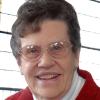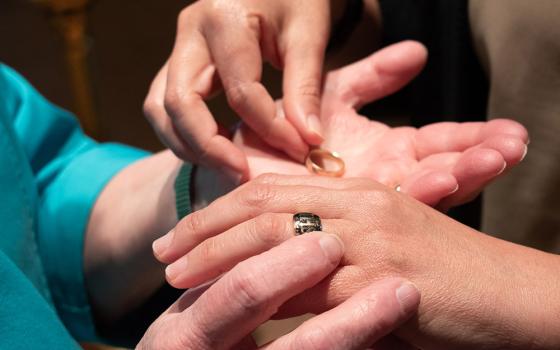
A woman is depicted at prayer in an ancient Christian mosaic seen in the Vatican's Pio Cristiano Museum. (Wikimedia Commons/Miguel Hermoso Cuesta)
A long time ago (40 years to be exact) in a land far away (northern Indiana to be exact), I think I functioned as a deacon. I performed diaconal tasks and duties, including visiting the sick, accompanying the dying, and doing baptismal and wedding preparations. I was carefully working with the annulment process as well. I brought the Eucharist to those who were homebound, conducted wakes, and held weekday Communion services where I broke open the Word.
Additionally, I provided counseling to parishioners and organized religious education classes and vacation bible schools, both based on the Gospels. I made sure the sacristy and sanctuary were in readiness for weekend Masses and I sometimes counted the collection. I think I was a deacon … or was I not?
These diaconal tasks fell to me because I became the pastoral administrator of a parish of 300 families following the sudden death of the pastor. The bishop of the diocese appointed me to this position, as I had been serving the parish as a pastoral associate for 10 months before the pastor died. It was a unique arrangement for the early '80s to have a non-ordained person overseeing a parish of this size.
The priest came to preside at the Saturday evening Mass and hear confessions. He stayed in the empty rectory so that he could preside over two additional Masses on Sunday. He then made a 45-minute drive back to his home. From Monday through Friday, he could be found in his office in the chancery.
Now, if you are wondering, I did not baptize anyone. I did not witness any exchange of vows or blessed marriages. I did not officiate at funerals or burials. I did not impart benediction with the Blessed Sacrament. I did not proclaim the Gospel during Mass on Sundays or holy days. I did not administer sacraments. And, I never wore an alb and a stole crossing my chest from the left shoulder to the waist on my right side. According to the Catechism of the Catholic Church, these are all functions that belong to permanent deacons, therefore, I was not a deacon.
Advertisement
However, if non-ordained women can perform nearly all the functions of ordained male deacons, why does the instrumentum laboris, the working paper for the first session of the synod on synodality, include the following statement on Page 46: "Most of the Continental Assemblies and the syntheses of several Episcopal Conferences call for the question of women's inclusion in the diaconate to be considered. Is it possible to envisage this, and in what way?"
This question has been asked before, first when the members of the Union of International Superiors General, or UISG, asked Pope Francis in 2016 to consider opening the diaconate to women, and then again during the Amazon synod in 2019. Both requests demonstrated a genuine need.
Phyllis Zagano notes in her book Women Religious, Women Deacons: Questions and Answers that "UISG members recognized that the clerical status [ordained diaconate] carries with it the more formal connection to the sacramental and ministerial life of the church. Secular women ministers, pastoral associates, catechists, and diocesan employees, including those of the various Orthodox churches, have recognized the same. Hence, the calls for the restoration of women to the ordained diaconate have become increasingly urgent in the past fifty years."
What does admission to the diaconate add to what women are already doing? Is it just another layer of clericalism? Is it just a means of climbing the clerical ladder? Does the diaconate make a woman a cleric? Yes, it does. But does it ensnare her in clericalism? That is certainly not a given. Could that happen? Only if a woman should forget that her admission to the diaconate is solely about ministry — about the needs of the church, the people of God, about service — diakonia.
For women it is not only about being able to do baptism preparation, but to baptize. It is not just about doing marriage preparation but witnessing marriage. It is not only about teaching about the Gospels, but about breaking open the Gospel message during Mass. Once again, I quote Phyllis Zagano who says, "The benefit to the church, the people of God, if a woman — religious or secular — is ordained as deacon is that she becomes more clearly identified as acting and being in the image of Christ, the servant, as well as acting on behalf of the bishop."
So I, too, ask a similar question to the voting members of the synod and ultimately Pope Francis himself: Is it possible to envision the reality of women's inclusion in the diaconate, and in what way?






